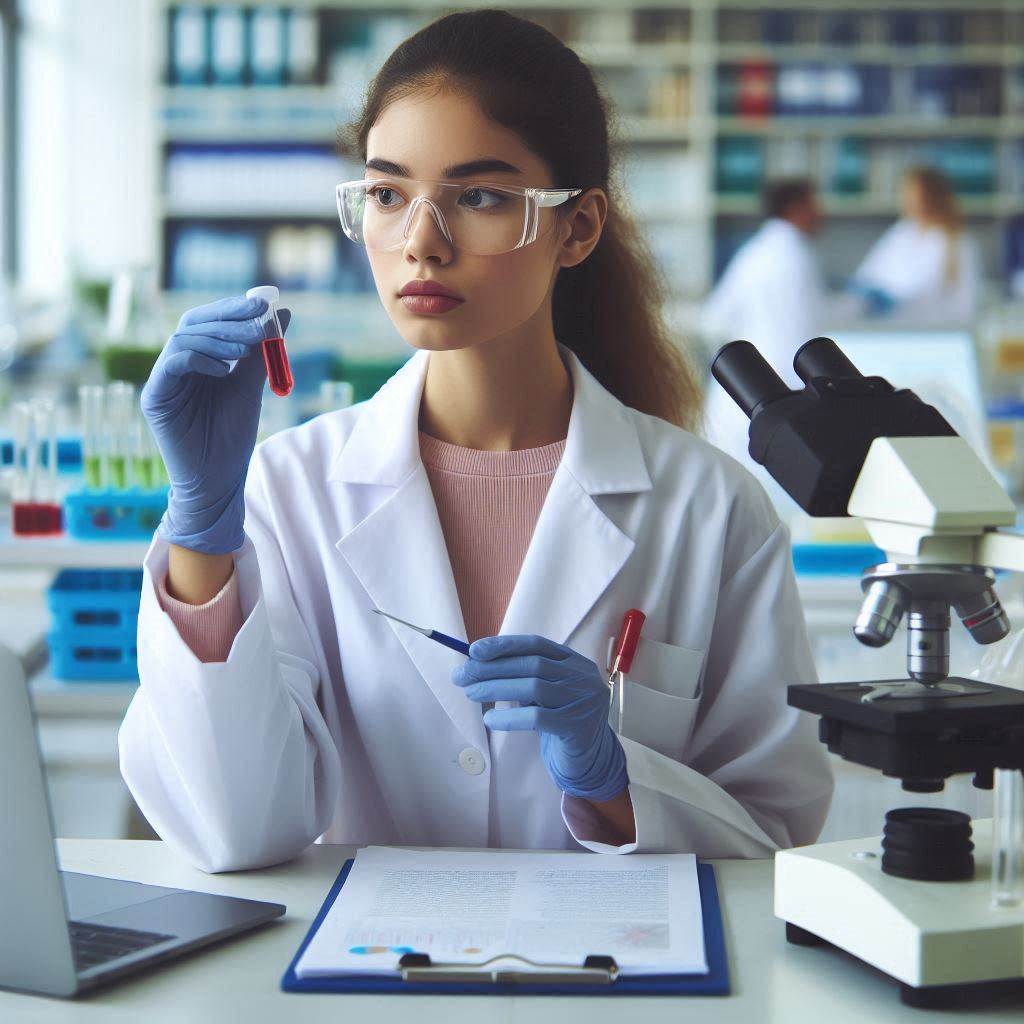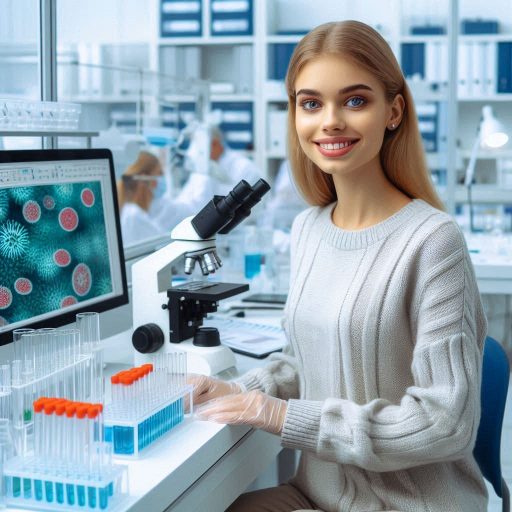Introduction
A microbiologist studies microorganisms like bacteria, viruses, and fungi, which are invisible to the naked eye.
These tiny organisms play a significant role in everything from human health to environmental stability.
Microbiologists contribute to various fields by helping prevent disease outbreaks, developing new medications, and improving food safety.
Their research is critical in tackling global challenges, such as antibiotic resistance and climate change.
Microbiologists are vital in healthcare, where they diagnose infections and develop vaccines.
In research, they discover breakthroughs that advance medical science and environmental conservation.
Their role in the environment involves understanding how microorganisms impact ecosystems, helping in waste treatment, and promoting sustainability.
This blog post aims to highlight the essential skills aspiring microbiologists need to succeed in their careers.
Whether you plan to work in a laboratory, hospital, or the field, mastering these skills will ensure you thrive in this evolving profession.
By developing strong analytical abilities, problem-solving expertise, and laboratory techniques, you‘ll be well-prepared to make significant contributions in microbiology.
Alongside technical knowledge, effective communication and collaboration are also critical for working in multidisciplinary teams.
Keep reading to discover the most important skills you‘ll need as you embark on your journey as a microbiologist.
Strong Background in Biology and Chemistry
A strong foundation in biology and chemistry is vital for aspiring microbiologists.
These two subjects serve as the core framework for understanding the intricate world of microorganisms and their processes.
Mastering these concepts enables you to build the necessary skills to excel in microbiology.
Importance of Understanding Basic Biological and Chemical Concepts
Understanding biological and chemical concepts is essential because microbiology is rooted in these disciplines.
Biology helps you explore cell structures, genetics, and metabolic functions that microorganisms rely on to survive and reproduce.
It also allows you to grasp how microorganisms interact with their environment, how they evolve, and how they impact health and ecosystems.
On the other hand, chemistry plays a crucial role in explaining how molecular interactions drive the processes of life.
Knowing how chemical reactions occur helps microbiologists understand metabolic pathways, enzyme functions, and how microbes process nutrients.
Without this foundational knowledge, the study of microorganisms would be incomplete, making it difficult to interpret how they survive, adapt, and thrive.
Required Coursework in College to Build a Solid Foundation
To build a strong foundation in biology and chemistry, certain college courses are essential.
In biology, aspiring microbiologists must take general biology courses that cover cell biology, genetics, molecular biology, and microbiology.
These courses introduce you to fundamental biological concepts that explain how cells function and how microorganisms reproduce.
More advanced courses, such as immunology or virology, offer a deeper understanding of microbial behavior and immune responses.
Chemistry is equally critical for microbiologists.
General chemistry introduces you to the principles of atomic structure, chemical bonding, and reactions.
Organic chemistry provides insights into carbon-based molecules, which are central to life processes.
Biochemistry bridges the gap between biology and chemistry by focusing on how chemical processes drive biological functions in microorganisms.
Together, these courses ensure you have the necessary knowledge to understand the biochemical mechanisms in microbes.
How Knowledge in These Subjects Enhances Understanding of Microbiology
A solid grounding in biology and chemistry enhances your ability to understand microbiology by providing the context needed to interpret microbial behavior.
Biological concepts help you understand microbial genetics, replication, and interactions, while chemical knowledge allows you to analyze how microbes metabolize, resist antibiotics, or adapt to their environment.
For example, understanding bacterial cell walls through chemistry helps explain how antibiotics target specific microbial processes.
Similarly, knowing microbial DNA replication through biology gives insight into how antibiotic resistance develops.
Together, biology and chemistry create a comprehensive picture of microbial life, enabling microbiologists to advance in fields like healthcare, environmental science, and biotechnology.
Read: Profiles in Success: Leading Chemists of the 21st Century in the US
Attention to Detail
The Importance of Precision and Accuracy in Microbiology
Attention to detail is crucial for precision and accuracy in microbiology.
Microbiologists work with microscopic organisms, and even minor mistakes can lead to inaccurate results.
Precision ensures that each step, from sample collection to final analysis, is performed with care.
Whether you are culturing bacteria or performing complex genetic sequencing, the smallest error can alter outcomes.
In microbiology, precision and accuracy are non-negotiable, as they directly impact the validity of research findings.
Ability to Observe and Document Microbial Characteristics Accurately
Microbiologists must observe and record microbial characteristics with exacting detail.
The differences between microorganisms are often subtle, requiring keen observation skills.
Factors like cell shape, motility, and reaction to stains can distinguish one species from another.
Accurate documentation is equally essential.
Recording these details in a thorough and organized manner ensures that results can be replicated.
Proper documentation also supports effective communication of findings, both within the lab and in published research.
How Attention to Detail Contributes to Successful Research and Analysis
Attention to detail plays a vital role in the success of microbiological research.
Microbiologists analyze complex data, from biochemical reactions to gene sequences.
A mistake in data entry, interpretation, or experiment setup can skew results and lead to false conclusions.
Being meticulous in every stage of research, from experiment design to data analysis, guarantees reliability.
In addition, detailed attention to safety protocols is necessary when working with pathogens or hazardous materials, ensuring safe lab practices.
Critical Thinking Skills
Critical thinking is one of the most crucial skills for any aspiring microbiologist.
It involves the ability to analyze data, draw logical conclusions, and apply problem-solving strategies.
In microbiology, where research and experimentation drive progress, these skills are indispensable.
Analyzing Data and Drawing Logical Conclusions
Microbiologists work with large sets of data, often generated from complex experiments.
The ability to carefully analyze this data is essential for identifying trends, outliers, or errors.
This involves not just looking at the numbers but understanding what they mean in the context of the experiment.
For instance, if a researcher studies the growth rate of bacteria under different environmental conditions, they must not only record the data but also interpret what the data reveals about the bacteria‘s behavior.
Without critical thinking, a microbiologist might miss important insights or, worse, draw incorrect conclusions.
To draw logical conclusions from data, a microbiologist must remain objective.
Personal biases or preconceived ideas can cloud judgment, leading to flawed conclusions.
For example, if an experiment appears to show no difference between control and experimental groups, a critical thinker will consider all factors.
They will evaluate the possibility of experimental error before deciding that there is no real effect.
This level of objectivity ensures that conclusions are based on evidence, not assumptions.
Problem-Solving in Microbiology
Problem-solving is another integral part of critical thinking in microbiology.
The nature of microbiological research often involves encountering unforeseen challenges.
Whether it‘s a contamination in a sample or unexpected results in an experiment, a skilled microbiologist needs to quickly identify the issue and develop a solution.
When faced with contamination, a microbiologist might retrace their steps to pinpoint the source.
They may adjust their methods, change equipment, or modify the environment to ensure accurate results.
This ability to troubleshoot and adapt is essential for resolving complex problems in the lab.
Similarly, critical thinking allows microbiologists to propose alternative hypotheses when initial theories don’t match the data.
This flexibility is key to pushing research forward when experiments do not go as planned.
Examples of Critical Thinking in Microbiology Research
Critical thinking is particularly valuable in experimental design.
When planning an experiment, a microbiologist must anticipate potential issues, such as variable interactions or equipment limitations.
By considering these factors early, they can design experiments that yield more reliable data.
For instance, in drug resistance studies, researchers must decide how to control variables like temperature and pH to isolate the effect of the drug.
In microbiology, critical thinking isn’t just about solving problems‘it‘s about asking the right questions.
Whether interpreting results, adjusting methods, or developing new hypotheses, the ability to think critically is what makes successful microbiologists excel in their field.
Read: The Life and Times of a U.S. Physicist: A Day in Detail
Laboratory Skills: Essential Competencies for Aspiring Microbiologists
Proficiency in Handling Lab Equipment and Materials
Aspiring microbiologists must develop strong laboratory skills to succeed in their field.
Proficiency in handling lab equipment and materials is crucial for accurate results.
In microbiology, precision and careful execution are vital, and handling delicate lab tools is a core competency.
These tools include pipettes, microscopes, autoclaves, and other essential equipment.
Without a firm grasp of lab tools, a microbiologist risks compromising the validity of their research.
To ensure proficiency, microbiologists must become comfortable with various instruments and practice their use regularly.
Knowledge of Safety Protocols and Procedures in a Lab Setting
Equally important is the knowledge of safety protocols and procedures in a lab setting.
Microbiologists often work with potentially hazardous microorganisms, chemicals, and biological samples.
Knowing how to handle these materials safely is critical to prevent contamination and accidents.
Proper sterilization techniques, using personal protective equipment (PPE), and disposing of biohazardous waste are key practices.
Being mindful of lab safety reduces the risk of contamination and ensures a secure working environment.
Safety protocols are not only vital for personal well-being but also for maintaining the integrity of experiments.
Importance of Hands-On Experience in a Laboratory Environment
Hands-on experience in the laboratory environment is essential for any aspiring microbiologist.
While theoretical knowledge provides a foundation, practical application deepens understanding.
Theoretical learning cannot replace the insights gained from real-world experimentation.
Aspiring microbiologists need to practice techniques such as culturing bacteria, staining microorganisms, and preparing samples.
These experiences help them refine their techniques and adapt to the challenges that may arise during research.
Working in the lab helps microbiologists become more efficient and precise.
This proficiency leads to better experimentation and more reliable data.
Microbiologists who regularly work in a lab setting are better equipped to troubleshoot fproblems that occur during experiments.
They learn to adjust procedures, calibrate equipment, and respond to unexpected issues.
The ability to adapt in real time is one of the most valuable skills a microbiologist can develop.
Additionally, hands-on experience fosters critical thinking and problem-solving abilities.
When working with microorganisms, unexpected results are common, and microbiologists must analyze these results to draw meaningful conclusions.
The laboratory becomes a space where they learn to ask the right questions, interpret data, and refine hypotheses.
Without adequate lab experience, aspiring microbiologists may struggle to apply their theoretical knowledge effectively.
Basically, aspiring microbiologists must master laboratory skills to thrive in their field.
Proficiency with lab equipment, strict adherence to safety protocols, and extensive hands-on experience are fundamental to their success.
These skills form the backbone of their ability to conduct effective research, solve complex problems, and contribute to scientific advancement.
Read: Salary Ranges: What to Expect as a Physicist in the USA

Communication Skills in Microbiology
Effective communication with colleagues, supervisors, and other professionals
Effective communication skills are essential for every aspiring microbiologist.
Microbiology involves complex ideas that must be shared clearly.
Professionals must communicate with colleagues, supervisors, and other experts in the field.
Strong verbal communication skills foster better collaboration and understanding.
Microbiologists often present research findings in meetings and conferences.
The ability to articulate complex concepts in simple terms is crucial.
Writing Skills for Research Papers, Reports, and Presentations
Writing skills are equally important for microbiologists.
They frequently write research papers, reports, and grant proposals.
Each document must convey ideas clearly and concisely.
Writing must adhere to specific formats and guidelines.
Microbiologists should familiarize themselves with the styles of scientific writing.
Clarity and precision in writing enhance the quality of their research.
In addition to reports, microbiologists prepare presentations.
They often present findings at seminars or conferences.
A well-structured presentation captures the audience’s attention.
Using visual aids effectively enhances understanding.
It helps convey key points succinctly and memorably.
Aspiring microbiologists should practice public speaking to build confidence.
The more they present, the more effective they become.
Transform Your Career Today
Unlock a personalized career strategy that drives real results. Get tailored advice and a roadmap designed just for you.
Start NowCollaboration with Other Scientists in a Team Setting
Collaboration is a key aspect of scientific research.
Microbiologists often work in teams to solve complex problems.
Teamwork requires clear communication to ensure everyone is on the same page.
Successful collaborations lead to innovative solutions and discoveries.
Respect for each team member‘s input fosters a positive environment.
Open discussions and brainstorming sessions stimulate creativity.
Networking with other scientists is another vital aspect.
Building professional relationships opens doors to new opportunities.
Attending conferences and workshops allows microbiologists to meet others in the field.
Sharing ideas and experiences with peers enriches their understanding.
They gain insights into different research methodologies and techniques.
Effective communication also extends to non-scientific audiences.
Microbiologists must explain their research to policymakers, educators, and the public.
They need to translate complex information into understandable terms.
This skill helps bridge the gap between science and society.
It is vital for promoting awareness about microbiology’s role in public health.
Moreover, aspiring microbiologists must learn to receive feedback.
Constructive criticism is part of the growth process.
Being open to suggestions improves their research and communication abilities.
It also enhances their ability to mentor others in the future.
In a nutshell, communication skills are fundamental for aspiring microbiologists.
They enable effective interactions with colleagues and the broader community.
Developing strong writing and verbal skills will enhance their professional journey.
Collaboration with fellow scientists fosters innovation and creativity.
By honing these skills, microbiologists can significantly impact their field.
Read: Physics Specializations: Choosing Your Path in the U.S.
Computer Literacy
In today’s rapidly evolving scientific landscape, computer literacy is a critical skill for every aspiring microbiologist.
As technology continues to shape research processes, the ability to use software for data analysis, modeling, and research simulations has become essential.
Microbiologists must not only conduct laboratory experiments but also leverage computer tools to interpret and manage complex data sets.
Utilizing Software for Data Analysis, Modeling, and Research Simulations
Microbiologists often work with large volumes of data collected from experiments.
Software tools enable them to analyze this data efficiently, identify patterns, and make informed conclusions.
Programs like Excel, R, and Python are commonly used for data analysis in microbiology.
These tools allow microbiologists to organize raw data, perform statistical tests, and create visualizations, enhancing the interpretation of results.
Additionally, modeling software, such as MATLAB, is essential for simulating biological processes.
This capability helps predict outcomes and improve experimental designs.
A microbiologist who masters these tools gains a significant advantage in their research efforts.
Knowledge of Bioinformatics Tools for Genomic Analysis
The rise of genomics has transformed microbiology, making bioinformatics a key area of study.
Microbiologists must understand bioinformatics tools that are designed for genomic analysis.
These tools enable researchers to sequence and compare genomes, identify mutations, and track the evolution of microorganisms.
Software such as BLAST, Clustal Omega, and MEGA provides powerful capabilities for analyzing DNA and protein sequences.
Knowledge of these bioinformatics platforms allows microbiologists to study the genetic makeup of microorganisms more precisely.
This understanding leads to breakthroughs in disease mechanisms, antibiotic resistance, and microbial evolution.
Importance of Staying Updated on Technological Advancements in Microbiology
Technological advancements in microbiology are continuous, and staying updated is crucial for aspiring microbiologists.
Emerging technologies such as CRISPR gene editing, high-throughput sequencing, and advanced imaging techniques are revolutionizing the field.
Microbiologists who are aware of and skilled in these technologies can drive innovative research and stay competitive in the job market.
Moreover, adopting the latest software tools ensures that microbiologists remain efficient in handling and analyzing the increasing amount of data generated by modern research techniques.
Essentially, computer literacy is an indispensable skill for aspiring microbiologists.
Proficiency in data analysis software, bioinformatics tools for genomic research, and staying current with technological advancements are key to success in this field.
Mastering these skills enhances research capabilities and opens doors to new opportunities in microbiology.
Whether analyzing experimental data, modeling biological processes, or conducting genomic studies, computer literacy is at the core of modern microbiology practices.
Adaptability and flexibility
Ability to Work in Diverse Research Environments
Adaptability and flexibility are critical skills every aspiring microbiologist must cultivate.
Research in microbiology often involves working in diverse environments, from clinical labs to field studies.
Microbiologists must be comfortable in various settings, adapting to unique working conditions and managing complex projects.
The ability to adjust to new environments enhances productivity.
It enables microbiologists to collaborate effectively with multidisciplinary teams.
Flexibility ensures microbiologists can thrive in high-tech labs or nature, collecting samples for further analysis.
Willingness to Learn New Techniques and Methodologies
Willingness to learn new techniques is crucial for adaptability.
Microbiology is a constantly evolving field, with new technologies and methodologies emerging regularly.
Microbiologists who stay current with these advancements gain a competitive edge.
Being open to learning allows for growth and innovation in research.
Whether mastering advanced genetic sequencing or learning new sample collection methods, a willingness to learn ensures microbiologists remain relevant in the field.
Adapting to Changes in Research Projects or Priorities
Adaptability also means adjusting to changes in research projects or priorities.
In microbiology, research can shift direction due to new discoveries or funding changes.
A microbiologist must remain flexible when experiments do not go as planned or new evidence alters the project’s course.
This flexibility allows for quick adjustments, ensuring the continuation of productive research.
Being able to pivot quickly and efficiently helps meet project deadlines and keeps progress on track, even when facing unexpected challenges.
Moreover, learning to adapt to new collaborations or shifts in team dynamics is essential in microbiology.
As research often involves collaborative efforts across various departments or organizations, being adaptable to different working styles is vital.
Effective communication and a flexible mindset help microbiologists integrate smoothly into new teams and environments.
This adaptability fosters innovation and creates room for fresh ideas that could push research forward.
The microbiology field is dynamic, and those who can adapt quickly and efficiently are more likely to succeed.
By embracing change, learning new techniques, and remaining flexible with research priorities, microbiologists open the door to endless opportunities.
Each project presents new challenges, but those who demonstrate adaptability will stand out in their ability to find solutions quickly and efficiently.
To sum it all up, aspiring microbiologists must focus on cultivating adaptability and flexibility.
The ability to thrive in diverse environments, stay current with new techniques, and adjust to changes in research priorities will help microbiologists succeed in this ever-evolving field.
This adaptability will not only make them better scientists but will also ensure their long-term success in the ever-changing world of microbiological research.
Find Out More: Understanding Forensic Psychology Basics
Conclusion
Aspiring microbiologists must develop a range of critical skills.
Strong analytical abilities are crucial for understanding complex biological data.
Attention to detail ensures accuracy when conducting experiments and interpreting results.
Problem-solving skills are essential for addressing unexpected challenges in research.
Communication skills are vital for presenting findings and collaborating with peers.
Equally important are technical skills, such as proficiency with laboratory equipment and software tools.
A deep understanding of microbiological techniques, including culturing and microscopy, is fundamental.
Time management is also key, allowing microbiologists to balance multiple projects and meet deadlines.
For future microbiologists, honing these skills will open doors to career opportunities.
Mastering them ensures you remain competitive and prepared for new challenges.
Dedication to improving your abilities will contribute to your success in this ever-evolving field.
Continuous learning is vital for growth in microbiology.
The field advances rapidly, requiring professionals to stay informed about new techniques, technologies, and discoveries.
Pursuing additional training and certifications will help you stay ahead and expand your knowledge.
In this exciting and dynamic field, those who embrace continuous growth and refine their skills will thrive.
Developing these essential skills will set the foundation for a successful and fulfilling microbiology career.
[E-Books for Sale]
The Big Book of 500 High-Paying Jobs in America: Unlock Your Earning Potential
$19.99 • 500 High-Paying Jobs • 330 pages
Explore 500 high-paying jobs in America and learn how to boost your career, earn more, and achieve success!
See All 500 High-Paying Jobs of this E-Book
1001 Professions Without a Degree: High-Paying American Jobs You Can Start Now
$19.99 • 1001 Professions Without a Degree • 174 pages
Discover 1001 high-paying jobs without a degree! Unlock career tips, skills, and success strategies for just $19.99!




